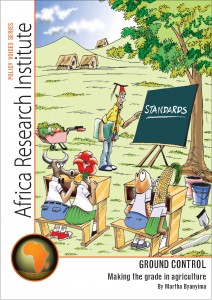 Standards for agriculture – particularly horticulture – are exacting. European governments have devised regulations for imported crops. African governments which fail to impose necessary checks across the entire agricultural supply chain are denied a market for their produce. The private sector, too, is increasingly involved in setting standards for agriculture. A parallel system of private voluntary standards responds to consumer concerns for food safety, the environment and labour conditions. Farmers in Africa – large and small – have had to adapt their methods to satisfy governments, retailers and consumers in export markets.
Standards for agriculture – particularly horticulture – are exacting. European governments have devised regulations for imported crops. African governments which fail to impose necessary checks across the entire agricultural supply chain are denied a market for their produce. The private sector, too, is increasingly involved in setting standards for agriculture. A parallel system of private voluntary standards responds to consumer concerns for food safety, the environment and labour conditions. Farmers in Africa – large and small – have had to adapt their methods to satisfy governments, retailers and consumers in export markets.
In this timely study, Martha Byanyima chronicles the history and development of agricultural standards in Africa. Although international standards often are considered a barrier to trade, she argues that they are in fact an opportunity – both within and outside Africa. Martha recognises the progress made by African countries to comply with agricultural standards, but is candid about that the difficulties which lie ahead. Institutional reform, education of smallholders and coordination of supply will test the skills and determination of African countries keen to increase their stake in a burgeoning global trade.
Author – Martha Byanyima






